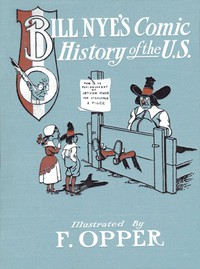Comic History of the United States by Bill Nye (book series for 10 year olds txt) 📗

- Author: Bill Nye
Book online «Comic History of the United States by Bill Nye (book series for 10 year olds txt) 📗». Author Bill Nye
GENERAL GAGE THINKING IT OVER.
General Gage was completely overcome, and asked for a moment to go apart and think it over, which he did, returning[Pg 165] with an air which reminded one of "Ten Nights in a Bar-Room."
"You may go, my brave boys; and be assured that if my troops molest you in the future, or anywhere else, I will overpower them and strew the Common with their corses.
"Of corse he will," said the hairy boy to the right of Whomsoever J. Opper, who afterwards became the father of a lad who grew up to be editor of the Persiflage column of the Atlantic Monthly.
Thus the boys of America impressed General Gage with their courage and patriotism and grew up to be good men.
LORD HOWE FELT THE COLD VERY KEENLY.
An expedition to Canada was fitted out the same winter, and an attack made on Quebec, in which General Montgomery was killed and Benedict Arnold showed that he was a brave soldier, no matter how the historian may have hopped on him afterwards.
The Americans should not have tried to take Canada. Canada was, as Henry Clay once said, a persimmon a trifle too high for the American pole, and it is the belief of the historian, whose tears have often wet the pages of this record, that in the future Canada will be what America is now, a free country with a national debt of her own, a flag of her own, an executive of her own, and a regular annual crisis of her own, like other nations.[Pg 166]
In 1776 Boston was evacuated. Washington, in order to ascertain whether Lord Howe had a call to fish, cut bait, or go ashore, began to fortify Dorchester Heights, March 17, and on the following morning he was not a little surprised to note the change. As the weather was raw, and he had been in-doors a good deal during the winter, Lord Howe felt the cold very keenly. He went to the window and looked at the Americans, but he would come back chilly and ill-tempered to the fire each time. Finally he hitched up and went away to Halifax, where he had acquaintances.
On June 28 an attack was made by the English on Fort Moultrie. It was built of palmetto logs, which are said to be the best thing in the world to shoot into if one wishes to recover the balls and use them again. Palmetto logs accept and retain balls for many years, and are therefore good for forts.
When the fleet got close enough to the fort so that the brave Charlestonians could see the expression on the admiral's face, they turned loose[Pg 167] with everything they had, grape, canister, solid shot, chain-shot, bar-shot, stove-lids, muffin-irons, newspaper cuts, etc., etc., so that the decks were swept of every living thing except the admiral.
JEFFERSON DICTATING THE DECLARATION OF INDEPENDENCE.
General Clinton by land tried to draw the attention of the rear gunners of the fort, but he was a poor draughtsman, and so retired, and both the land and naval forces quit Charleston and went to New York, where board was not so high.
FAC-SIMILE OF DICTATION.
RINGING THE
LIBERTY BELL.
July 4 was deemed a good time to write a Declaration of Independence and have it read in the grove.[Pg 168]
Richard Henry Lee, of Virginia, moved that "the United Colonies are, and of right ought to be, free and Independent states." John Adams, of Massachusetts, seconded the resolution. This was passed July 2, and the report of the committee appointed to draw up a Declaration of Independence was adopted July 4.
The Declaration was dictated by Thomas Jefferson, who wrote the most melodious English of any American of his time.
Jefferson had a vocabulary next to Noah Webster, with all the dramatic power of Dan. He composed the piece one evening after his other work. We give a facsimile of the opening lines.
Philadelphia was a scene of great excitement. The streets were thronged, and people sat down on the nice clean door-steps with perfect[Pg 169] recklessness, although the steps had just been cleaned with ammonia and wiped off with a chamois-skin. It was a day long to be remembered, and one that made George III. wish that he had reconsidered his birth.
In the steeple of the old State-House was a bell which had fortunately upon it the line "Proclaim liberty throughout all the land unto all the inhabitants thereof." It was rung by the old man in charge, though he had lacked faith up to that moment in Congress. He believed that Congress would not pass the resolution and adopt the Declaration till after election.
Thus was the era of good feeling inaugurated both North and South. There was no North then, no South, no East, no West; just one common country, with Washington acting as father of same. Oh, how nice it must have been!
Washington was one of the sweetest men in the United States. He gave his hand in marriage to a widow woman who had two children and a dark red farm in Virginia.[Pg 170]
CHAPTER XVII. THE BEGINNING OF THE END.The British army now numbered thirty thousand troops, while Washington's entire command was not over seven thousand strong. The Howes, one a general and the other an admiral, now turned their attention to New York. Washington, however, was on the ground beforehand.
Howe's idea was to first capture Brooklyn, so that he could have a place in which to sleep at nights while engaged in taking New York.
The battle was brief. Howe attacked the little army in front, while General Clinton got around by a circuitous route to the rear of the Colonial troops and cut them off. The Americans lost one thousand men by death or capture. The prisoners were confined in the old sugar-house on Liberty Street, where they suffered the most miserable and indescribable deaths.
The army of the Americans fortunately escaped by Fulton Ferry in a fog, otherwise it would have been obliterated. Washington now fortified Harlem Heights, and later withdrew to White Plains.[Pg 171] Afterwards he retired to a fortified camp called North Castle.
Howe feared to attack him there, and so sent the Hessians, who captured Fort Washington, November 16.
NYE AS THE
DUKE OF SANDY BOTTOM.
It looked scaly for the Americans, as Motley says, and Philadelphia bade fair to join New York and other cities held by the British. The English van could be seen from the Colonial rear column. The American troops were almost barefooted, and left their blood-stained tracks on the frozen road.
It was at this time that Washington crossed the Delaware and thereby found himself on the other side; while Howe decided to remain, as the river was freezing, and when the ice got strong enough, cross over and kill the Americans at his leisure. Had he followed the Colonial army, it is quite sure now that the English would have conquered, and the author would have been the Duke of Sandy Bottom, instead of a plain American citizen, unknown, unhonored, and unsung.
Washington decided that he must strike a daring blow while his troops had any[Pg 172] hope or vitality left; and so on Christmas night, after crossing the Delaware as shown elsewhere, he fell on the Hessians at Trenton in the midst of their festivities, captured one thousand prisoners, and slew the leader.
The Hessians were having a symposium at the time, and though the commander received an important note of warning during the Christmas dinner, he thrust it into his pocket and bade joy be unconfined.
When daylight came, the Hessians were mostly moving in alcoholic circles trying to find their guns. Washington lost only four men, and two of those were frozen to death.
The result of this fight gave the Colonists courage and taught them at the same time that it would be best to avoid New Jersey symposiums till after the war was over.
Having made such a hit in crossing the Delaware, Washington decided to repeat the performance on the 3d of January. He was attacked at Trenton by Cornwallis, who is known in history for his justly celebrated surrender. He waited till morning, having been repulsed at sundown. Washington left his camp-fires burning, surrounded the British, captured two hundred prisoners, and got away to Morristown Heights in safety. If the ground had not frozen, General Washington could not have moved his forty can[Pg 173]non; but, fortunately, the thermometer was again on his side, and he never lost a gun.
September 11 the English got into the Chesapeake, and Washington announced in the papers that he would now fight the battle of the Brandywine, which he did.
THE COLONIAL SURPRISE-PARTY AT TRENTON.
Marie Jean Paul Roch Yves Gilbert Motier, Marquis de La Fayette, fought bravely with the Americans in this battle, twice having his name shot from under him.
The patriots were routed, scoring a goose-egg and losing Philadelphia.[Pg 174]
October 4, Washington attacked the enemy at Germantown, and was beaten back just as victory was arranging to perch on his banner. Poor Washington now retired to Valley Forge, where he put in about the dullest winter of his life.
The English had not been so successful in the North. At first the Americans could only delay Burgoyne by felling trees in the path of his eight thousand men, which is a very unsatisfactory sort of warfare, but at last Schuyler, who had borne the burden and heat of the day, was succeeded by Gates, and good luck seemed to come slowly his way.
A foolish boy with bullet-holes cut in his clothes ran into St. Leger's troops, and out of breath told them to turn back or they would fill a drunkard's grave. Officers asked him about the numbers of the enemy, and he pointed to the leaves of the trees, shrieked, and ran for his life. He ran several days, and was barely able to keep ahead of St. Leger's troops by a neck.
Burgoyne at another time sent a detachment under Colonel Baum to take the stores at Bennington, Vermont. He was met by General Stark and the militia. Stark said, "Here come the redcoats, and we must beat them to-day, or Molly Stark is a widow." This neat little remark made an instantaneous hit, and when they counted up[Pg 175] their string of prisoners at night they found they had six





Comments (0)